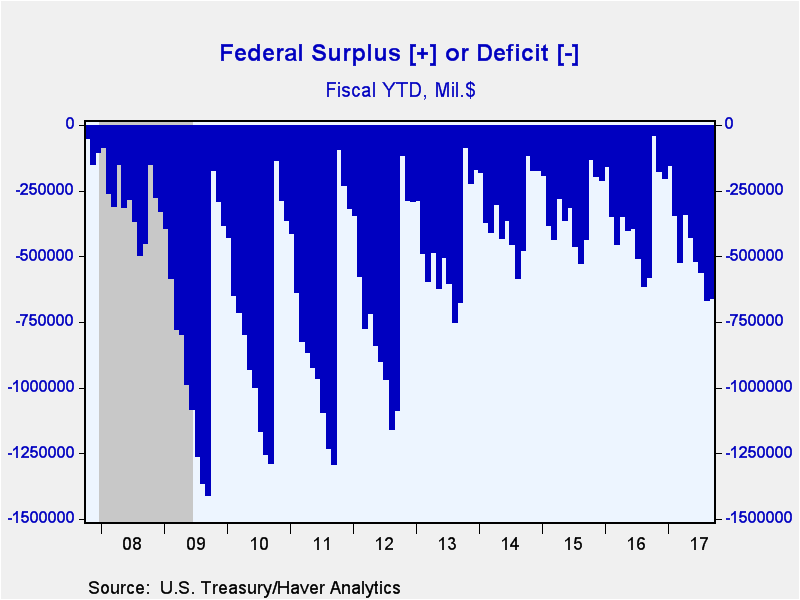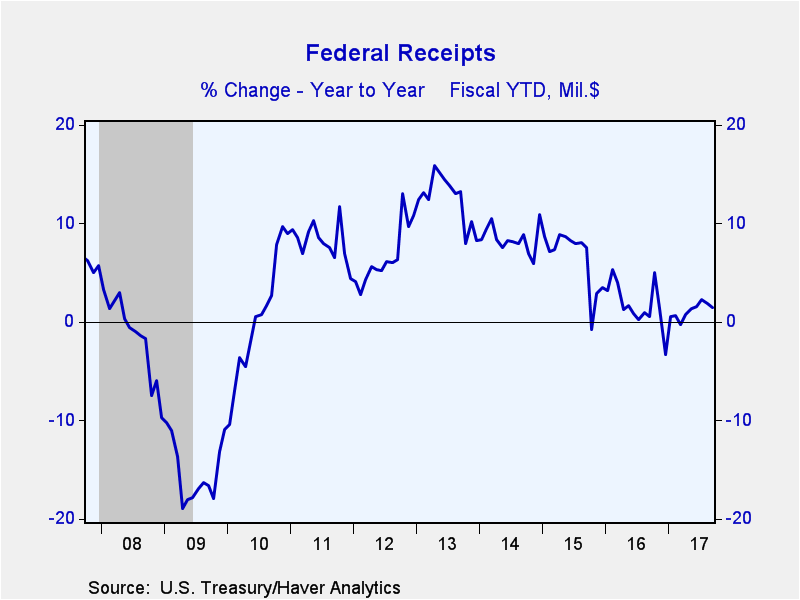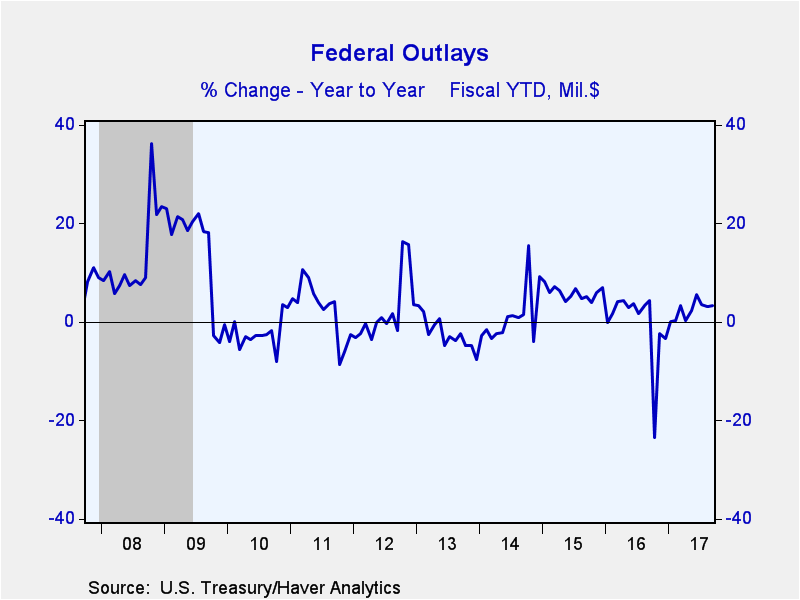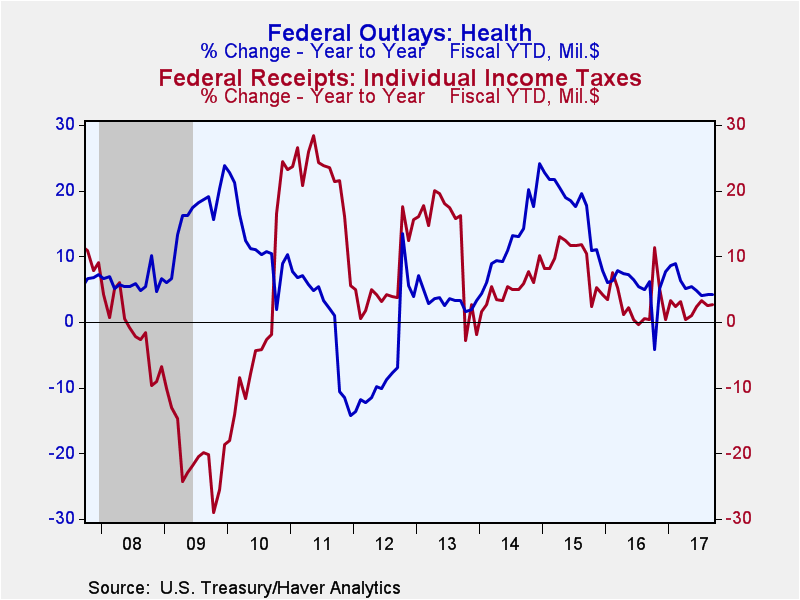 Global| Oct 23 2017
Global| Oct 23 2017U.S. Gov't Budget Deficit Deepens in Fiscal Year 2017
by:Tom Moeller
|in:Economy in Brief
Summary
The U.S. Treasury Department reported that in FY'17 the federal government ran a $665.7 billion budget deficit compared to a $585.6 billion deficit in FY'16. During September alone, the surplus of $8.0 billion compared to a $33.4 [...]
The U.S. Treasury Department reported that in FY'17 the federal government ran a $665.7 billion budget deficit compared to a $585.6 billion deficit in FY'16. During September alone, the surplus of $8.0 billion compared to a $33.4 billion surplus in 2016. A September surplus of $10.0 billion had been expected in the Action Economics Forecast Survey.
Overall net revenues improved 1.5% y/y in FY'17 after a 0.6% rise during FY'16. Individual income taxes increased 2.7% y/y following a 0.3% gain in all of FY'16. Social insurance contributions increased 4.2% y/y after a 4.7% rise, while excise taxes fell 11.8% y/y after a 3.3% decline. Corporate income taxes slipped 0.8% in FY'17 following a 12.9% drop in FY'16.
Government spending increased 3.3% in FY'17 compared to 4.5% growth during all of the previous year. Health insurance spending improved 4.1% y/y after a 6.2% rise in FY'16, while Medicare outlays nudged 0.6% y/y after an 8.7% gain last year. Income security payments fell 2.1% y/y with lower unemployment, but Social Security payments increased a steady 3.1% y/y. National defense expenditures grew 0.8% y/y in FY'17 compared to 0.7% growth last year, while interest outlays strengthened 9.2% after a 7.8% FY'16 gain.
Haver's data on Federal Government outlays and receipts are contained in USECON. Considerable detail is given in the separate GOVFIN database. The Action Economics Forecast Survey numbers are in the AS1REPNA database.
| United States Government Finance | FY'17 | FY'16 | FY'15 | FY'14 | FY'13 | |
|---|---|---|---|---|---|---|
| Budget Balance | -- | $-665.7 bil. | $-585.6 bil. | $-439.1 bil. | $-483.4 bil. | $-680.2 bil. |
| As a percent of GDP | -- | 3.5% | 3.2% | 2.5% | 2.8% | 4.1% |
| % of Total | ||||||
| Net Revenues (Fiscal Year YTD 2017, Y/Y % Change) | 100 | 1.5% | 0.6% | 7.6% | 8.9% | 13.3% |
| Individual Income Taxes | 47 | 2.7 | 0.3 | 10.5 | 5.9 | 16.3 |
| Corporate Income Taxes | 9 | -0.8 | -12.9 | 7.2 | 17.3 | 12.9 |
| Social Insurance Taxes | 34 | 4.2 | 4.7 | 4.1 | 8.0 | 12.1 |
| Excise Taxes | 3 | -11.8 | -3.3 | 5.3 | 11.1 | 6.3 |
| Net Outlays (Fiscal Year 2017 YTD, Y/Y % Change) | 100 | 3.3 | 4.5 | 5.3 | 1.4 | -2.4 |
| National Defense | 15 | 0.8 | 0.7 | -2.3 | -4.7 | -6.3 |
| Health | 15 | 4.1 | 6.2 | 17.8 | 14.3 | 3.3 |
| Medicare | 15 | 0.6 | 8.7 | 6.7 | 2.8 | 5.5 |
| Income Security | 13 | -2.1 | 1.0 | -0.9 | -4.3 | -1.1 |
| Social Security | 24 | 3.1 | 3.2 | 4.4 | 4.5 | 5.2 |
| Veterans Benefits & Services | 4 | 1.2 | 9.3 | 6.8 | 7.7 | 11.5 |
| Education, Training, Employment & Social Services | 4 | 31.6 | -10.2 | 34.7 | 25.9 | -21.9 |
| Interest | 7 | 9.2 | 7.8 | -1.8 | 2.8 | 0.4 |
Tom Moeller
AuthorMore in Author Profile »Prior to joining Haver Analytics in 2000, Mr. Moeller worked as the Economist at Chancellor Capital Management from 1985 to 1999. There, he developed comprehensive economic forecasts and interpreted economic data for equity and fixed income portfolio managers. Also at Chancellor, Mr. Moeller worked as an equity analyst and was responsible for researching and rating companies in the economically sensitive automobile and housing industries for investment in Chancellor’s equity portfolio. Prior to joining Chancellor, Mr. Moeller was an Economist at Citibank from 1979 to 1984. He also analyzed pricing behavior in the metals industry for the Council on Wage and Price Stability in Washington, D.C. In 1999, Mr. Moeller received the award for most accurate forecast from the Forecasters' Club of New York. From 1990 to 1992 he was President of the New York Association for Business Economists. Mr. Moeller earned an M.B.A. in Finance from Fordham University, where he graduated in 1987. He holds a Bachelor of Arts in Economics from George Washington University.
More Economy in Brief
 Global| Feb 05 2026
Global| Feb 05 2026Charts of the Week: Balanced Policy, Resilient Data and AI Narratives
by:Andrew Cates










